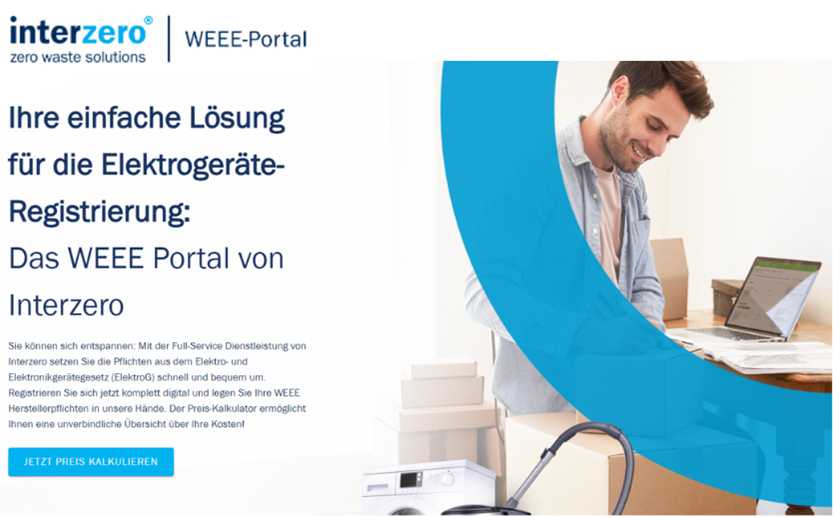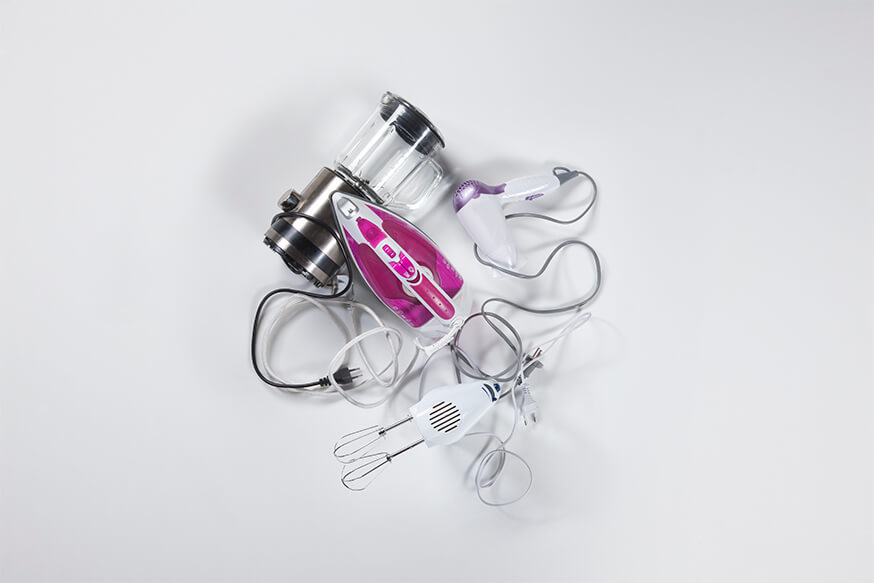Digital registration of electrical devices
The amended Act, which entered into force in 2022, imposes a duty of taking back products and ensuring their environmentally friendly disposal on all manufacturers and distributors of electrical and electronic equipment. With the Interzero WEEE Portal, small to mid-size manufacturers and e-commerce retailers of B2C devices benefit in particular from our integrated range of services.
Integrated service with fee calculator

Our services:
- Manufacturer registration with the German Clearing House (EAR)
- Authorised agent service
- Insolvency-proof guarantee
- Take-back system for your waste electrical equipment
Your benefits at a glance:
Digital management
From account setup to registration, quantity declarations and management of your device types and brands: our intuitive WEEE Portal is the one, centralised place to manage your duties as a manufacturer simply and securely.
Customised advice
We put our customers and their needs first. You can contact our experienced team for advice at any time if you have questions or need clarification about the ElektroG, WEEE, or the registration of your electrical devices.
Information service
We keep you informed about changes to the ElektroG and any related legislation that is relevant for your business. We provide you with the necessary information for manufacturers and also inform you about the mandatory labelling requirements you need to comply with.
EPR rules for marketplaces and fulfilment service providers

Since 1 July 2023, operators of online marketplaces and fulfilment service providers must ensure that manufacturers and retailers have correctly registered their electrical and electronic equipment with the German Clearing House (EAR). If this is not the case, operators of online marketplaces are prohibited from offering or supplying electrical equipment from these parties. Equally, fulfilment service providers must no longer pack, address or ship any electrical or electronic equipment from these manufacturers.
The Interzero WEEE Portal offers manufacturers and retailers an integrated portfolio of services for registration as per the ElektroG with the German Clearing House (EAR) for EPR (Extended Producer Responsibility), so that sales on electronic marketplaces and via fulfilment service providers can avoid legal problems. We make sure that all business partners possess a valid WEEE registration number and fulfil their duties in order to avoid potential fines or even a ban on sales.

CEO Interzero EPR Services GmbH
Frequently asked questions:
- What is the German Electrical and Electronic Equipment Act (ElektroG)?
The ElektroG1 is the German transposition of the EU WEEE Directive, which regulates the placing on the market, take-back and disposal of electrical and electronic devices. The ElektroG first entered into force in Germany in 2005 and has seen several amendments since – it was last amended on 1 January 2022.
Every member state within the EU has its own national WEEE law, based on the EU WEEE Directive mentioned above.
The original texts of the ElektroG and WEEE Directive can be found at: www.stiftung-ear.de/de/service/rechtliche-grundlagen
1 Act Regulating the Placing on the Market, Take-Back and Environmentally Compatible Disposal of Electrical and Electronic Equipment (Electrical and Electronic Equipment Act - ElektroG)
2 Directive 2012/19/EU of the European Parliament and of the Council of 4 July 2012 on waste electrical and electronic equipment (WEEE)
- What does WEEE mean?
WEEE stands for Waste Electrical and Electronic Equipment.
- Which products are governed by the provisions of the ElektroG?
The ElektroG applies to all electrical and electronic equipment. As defined by the text of the law, these are devices
a. designed for operation with AC voltage not exceeding 1,000 V or DC voltage not exceeding 1,500 V; and
b. dependent for their intended operation on electric currents or electromagnetic fields; or
c. used for the generation, conduction and measurement of electric currents and electromagnetic fields.
The ElektroG places electrical and electronic equipment into the following categories:
(1) Temperature exchange equipment
(2) Screens, monitors and equipment containing screens having a surface greater than 100 cm2
(3) Lamps
(4) Equipment having at least one external dimension greater than 50 centimetres (large equipment)
(5) Equipment having no external dimensions greater than 50 centimetres (small equipment)
(6) Small IT and telecommunication equipment having no external dimensions greater than 50 centimetres
Examples of devices from each category are given in annex 1 of the ElektroG, see www.stiftung-ear.de/de/service/rechtliche-grundlagen.
Electrical and electronic equipment is also classified as either B2C (products for consumers) or B2B (products for commercial/professional users). Within the categories as mentioned above, devices are further categorised according to device type. There are nine device types for B2C devices and eight device types for B2B devices.
Important: You can visit the German Clearing House (EAR) website to find out whether your electrical device is already registered. On the EAR website (ear-system.de), you can browse the public directory of registered manufacturers and registered authorised agents maintained in accordance with the ElektroG.
- Who needs to comply with the ElektroG?
The ElektroG defines duties in conjunction with the placing on the market, take-back and disposal of electrical and electronic equipment, not only for manufacturers of electrical and electronic equipment but also for commercial retailers (distributors) of electrical and electronic equipment. The decision as to which of these roles applies to a company in accordance with the ElektroG is essential in order to assess the company’s compliance status.
The ElektroG also applies to citizens, owners of used electrical items subject to disposal regulations, (publicly owned) waste management companies and primary treatment facilities.
- What duties does the ElektroG impose on manufacturers in Germany?
As a manufacturer, you have the following responsibilities:
1. Apply to the German Clearing House (EAR) for a manufacturer registration for your electrical equipment
2. For retailers not domiciled in Germany: appoint an authorised agent (mandatory for retailers not based in Germany)
3. Secure an insolvency-proof guarantee and submit this to the German Clearing House (EAR)
4. Commission a take-back system with the collection and sorting of the waste electrical equipment
5. Label the devices (manufacturer identification and bin symbol – see ‘Mandatory labelling requirements for manufacturers’)
6. Inform end users (about options for returning equipment, etc. – see ‘Information duties for manufacturers’)
- What duties does the ElektroG impose on distributors in Germany?
Distributors as defined by the ElektroG have the following responsibilities:
1. In some cases (depending on the size of the sales/storage space or the shipping/storage space), a take-back duty for used electrical items that could be used in private households (B2C equipment)
2. Duty to ensure the proper treatment or recycling of collected used electrical equipment or the handing of such equipment to a public body or authorised manufacturer/ElektroG agent
3. Duty to provide information to customers (e.g. regarding the duty to ensure separate disposal, return options for used electrical items and the removal of batteries)
4. Submission of annual declarations to the German Clearing House (EAR).

